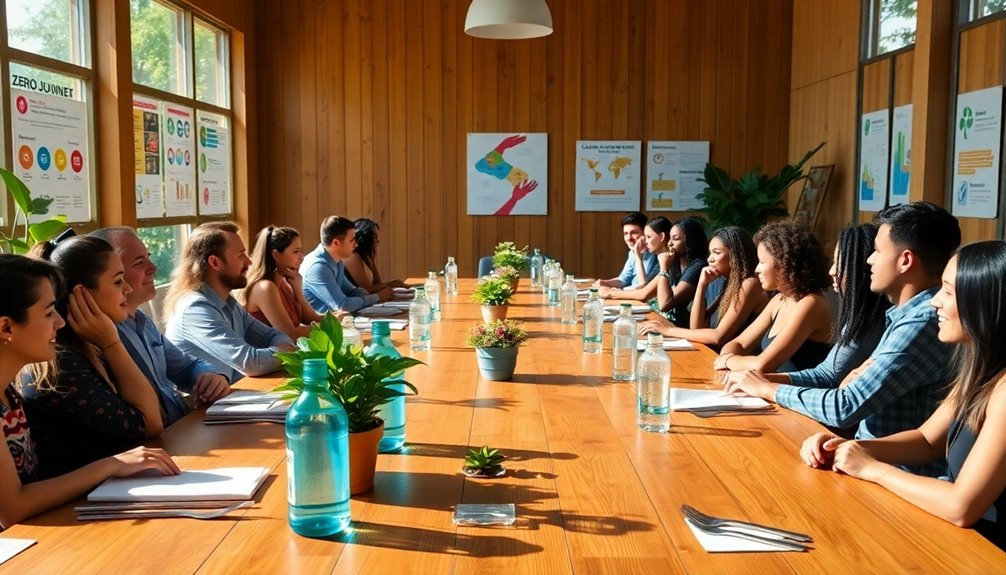Creating a zero waste policy for your retreat center is essential for sustainability. Start by setting clear waste diversion goals, aiming for at least 90% diversion from landfills. Implement a three-stream waste management system to sort compost, recycling, and landfill waste. Engage your community with workshops and social media campaigns to promote eco-conscious practices. Focus on reducing food waste by establishing a compost program and using reusable dining options. Track your waste diversion rates to measure success and refine strategies. Mastering these strategies will help you create a thriving, sustainable retreat. There's more to uncover, and you'll want to know the details.
Key Takeaways
- Establish a comprehensive waste management system with clearly marked bins for compost, recycling, and landfill to encourage proper material sorting.
- Source sustainable vendors who align with zero waste goals, emphasizing reusable and eco-friendly materials in all operations.
- Implement a composting program for organic waste and promote family-style dining to reduce reliance on single-use items.
- Engage the community through workshops, volunteer opportunities, and social media campaigns to raise awareness and foster a culture of sustainability.
- Track and measure waste diversion rates and gather feedback to continuously refine strategies and highlight successful sustainability initiatives.
Importance of Zero Waste
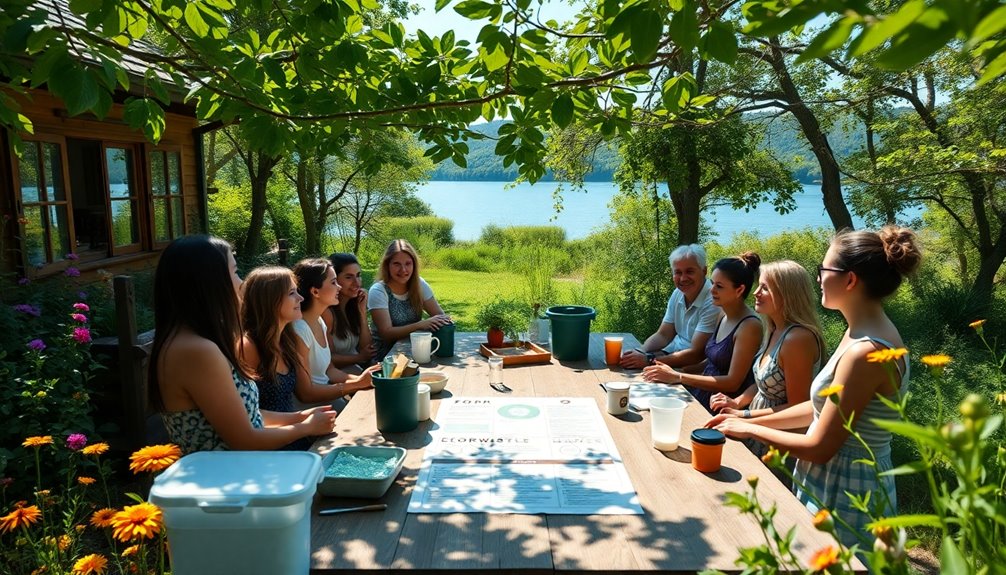
When you embrace a zero-waste policy at your retreat center, you're not just reducing environmental impact; you're also taking a significant step toward sustainability.
Implementing effective waste management practices helps you minimize the carbon footprint linked to waste disposal. By prioritizing ways to reduce waste, you demonstrate leadership in sustainability that attracts eco-conscious clients and attendees.
This commitment can lead to substantial cost savings on materials and waste disposal fees, allowing you to reinvest in sustainable alternatives. Engaging your employees and stakeholders fosters a sense of community, transforming waste management into a collective effort. Additionally, adopting practices like easy composting can further enhance your sustainability efforts and reduce organic waste.
Ultimately, your dedication to zero waste positions your center as a leader in sustainable event management, inspiring others in the industry to follow suit.
Defining Zero Waste Goals
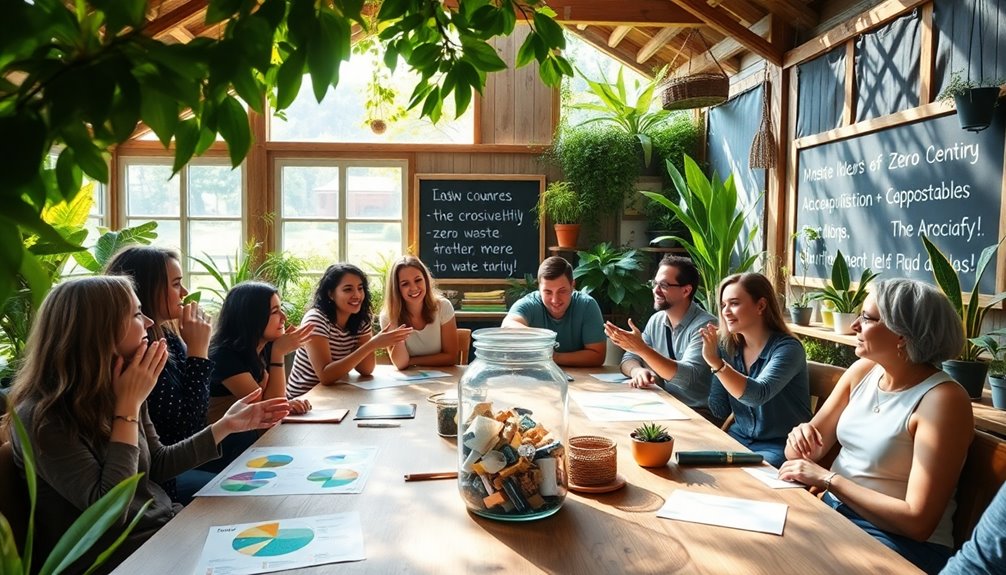
When you define zero waste goals for your retreat center, start by establishing clear waste diversion targets that aim to keep at least 90% of waste out of landfills.
Promote reuse and recycling through practical strategies that encourage your guests to actively participate.
This approach not only minimizes your environmental impact but also fosters a culture of sustainability within your community.
Establish Waste Diversion Targets
Establishing waste diversion targets is vital for your retreat center's journey toward zero waste. Aim to divert at least 90% of waste from landfills through effective reduction, recycling, composting, and reuse practices.
Set specific targets, like reducing overall waste generation by 30% in the first year and reaching that impressive 90% diversion by the end of three years.
Collaborate with local vendors to guarantee sustainable sourcing, prioritizing reusable alternatives and compostable materials.
It's essential to monitor and track your waste data regularly, allowing you to make informed adjustments to your strategies.
Engage both attendees and staff in these efforts by providing education and resources, making sure everyone understands their role in achieving your zero waste goals.
Promote Reuse and Recycling
To effectively promote reuse and recycling at your retreat center, it's crucial to define clear zero waste goals. Aim to divert over 90% of waste from landfills by implementing effective strategies like composting, recycling, and reusing materials.
Collaborate with local vendors who prioritize sustainable practices, offering reusable foodware to minimize single-use items. Establish a three-stream waste management system with clearly labeled bins for compost, recycling, and landfill waste to guide attendees in proper disposal.
Organize educational workshops for staff and participants to raise awareness about the importance of reducing waste. Finally, track and measure your waste diversion rates after each event to assess progress and identify areas for continued improvement in your zero waste journey.
Steps to Implement Zero Waste
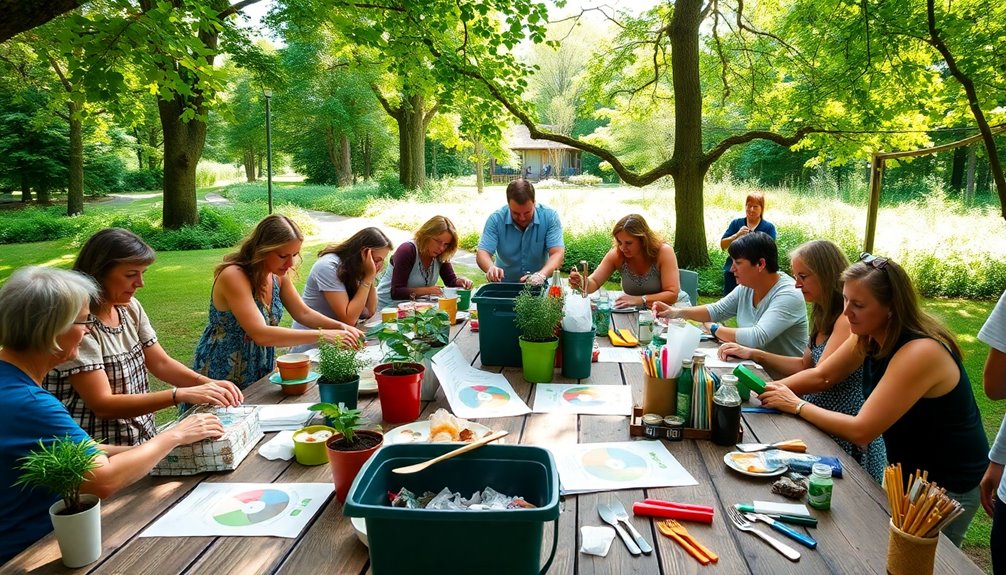
To effectively implement zero waste at your retreat center, start by selecting venues that prioritize sustainability in their operations and practices.
You'll also want to focus on sustainable sourcing, ensuring that vendors align with your zero waste goals by offering eco-friendly options.
Venue Selection Criteria
When you're selecting a venue for your retreat, prioritizing sustainability can greatly reduce waste and enhance the overall experience.
Look for venues that demonstrate a commitment to sustainable practices, like those with LEED certification and established waste management systems.
Check if they provide on-site composting and recycling facilities to properly dispose of event waste.
Assess catering options that partner with local farms and have food waste reduction policies.
Consider venues that offer reusable serviceware and decorations, which help minimize single-use items.
Finally, confirm that the venue can accommodate waste recovery stations, essential for educating attendees on proper waste sorting and ensuring your retreat is a sustainable event.
This thoughtful selection will support your zero waste goals. Additionally, venues that utilize renewable energy solutions can significantly reduce their carbon footprint, aligning with your sustainability objectives.
Sustainable Sourcing Practices
Sourcing sustainably is essential for minimizing waste at your retreat, as it directly impacts both the environment and the local community.
Here are some effective strategies to implement sustainable sourcing practices:
- Partner with local vendors who use sustainable methods and provide organic or locally sourced food. This reduces transportation emissions and boosts the local economy.
- Encourage digital communication for marketing materials, minimizing paper waste by directing guests to online resources instead of printed brochures.
- Use reusable or compostable products for foodware and invite guests to bring their own containers for takeout meals, considerably cutting down on single-use plastics.
- Consider incorporating partnerships with eco-friendly accommodations that align with your sustainability goals, enhancing the overall experience for your guests.
Engaging Your Community
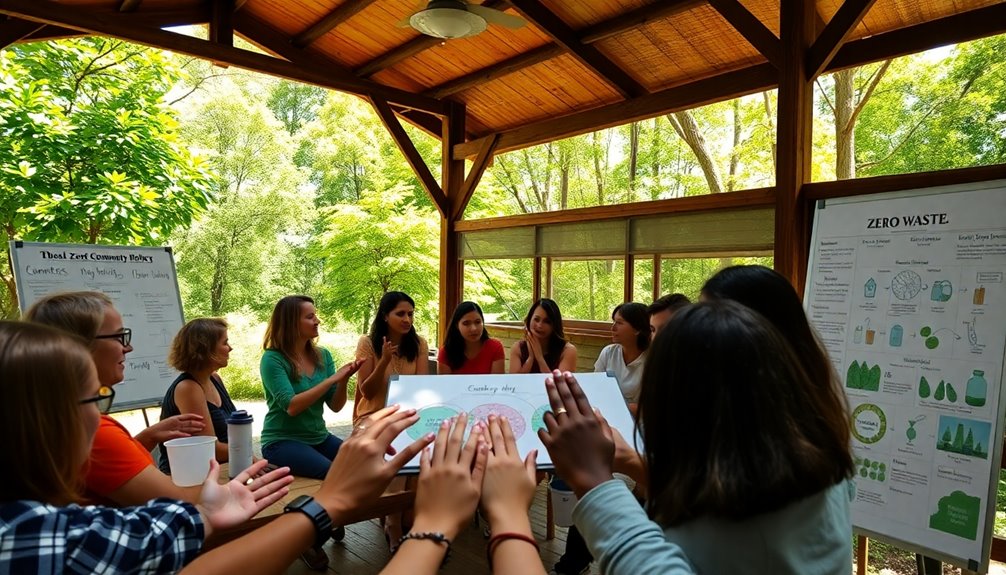
How can you effectively engage your community in sustainability efforts? Start by hosting interactive workshops and events that focus on zero waste practices. This not only educates attendees but also promotes a positive impact on waste reduction.
Collaborate with local businesses to support zero waste initiatives, as many consumers prefer to buy from environmentally responsible companies. Utilize social media campaigns to share success stories and practical tips on zero waste living, which can greatly boost engagement.
Finally, create volunteer opportunities for community members to take part in waste audits and clean-up activities. This builds a sense of ownership and accountability, making your community more invested in sustainability efforts and committed to long-term zero waste principles. Additionally, consider incorporating the art of decluttering strategies to help community members better manage their waste and belongings.
Tracking and Measuring Success
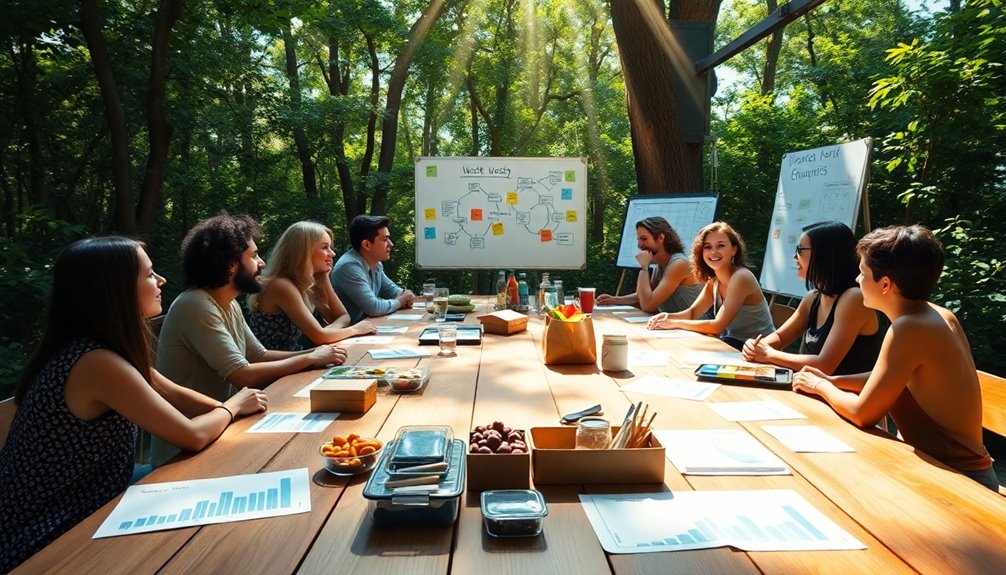
Building on your community engagement, tracking and measuring success is essential to gauge the impact of your sustainability efforts.
Implement a waste tracking system that categorizes waste streams into compost, recycling, and landfill. Use pre-event and post-event waste audits to assess waste generated and diverted, aiming for at least 90% diversion to achieve zero waste status.
Here are three key actions to take:
- Analyze data on food waste and recycling rates to refine your strategies.
- Gather participant feedback on initiatives like reusable water bottles to understand perceptions.
- Share your waste data and success stories with stakeholders to inspire ongoing commitment.
Strategies for Food Waste Reduction
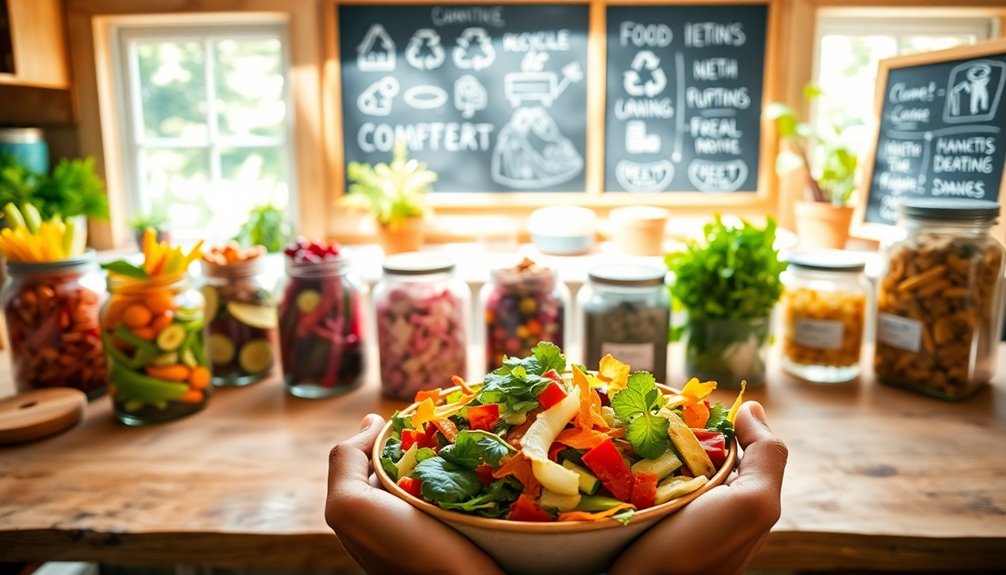
While hosting events, it's crucial to prioritize food waste reduction, as this not only helps the environment but also enhances your center's sustainability efforts.
Start by implementing a sustainable catering policy that partners with local vendors for composting food scraps and donating leftovers to food banks.
Utilize meal planning and portion control to match your attendees' needs, minimizing the amount of waste generated.
Incorporate educational sessions that highlight the environmental impact of food waste, reminding guests that around 1.7 billion tons are wasted globally each year.
Establish a composting program for organic waste and encourage the use of reusable foodware, opting for family-style dining instead of individual servings to reduce reliance on single-use items.
Additionally, consider integrating mindfulness practices to promote a culture of awareness around sustainability and waste reduction among your guests.
Alternatives to Single-Use Plastics
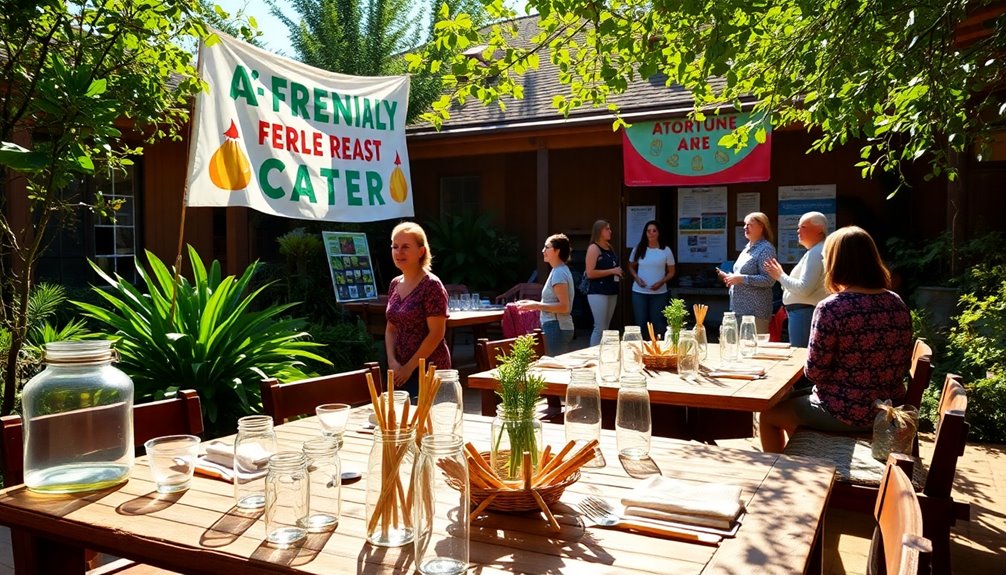
As you seek to enhance sustainability at your retreat center, exploring alternatives to single-use plastics is essential. Shifting to these options can greatly reduce waste and promote eco-friendly practices.
Consider implementing the following:
- Refillable Beverage Stations: Offer stations to eliminate single-use plastic bottles, potentially saving up to 5 million bottles annually.
- Compostable Foodware: Replace traditional plastic disposables with compostable options, helping to combat the 1.7 billion tons of global food waste.
- Encourage Reusables: Motivate participants to bring their own bags and containers, cutting waste footprints by up to 60%. Additionally, eco-friendly materials can play a significant role in reducing the environmental impact of your retreat center.
Highlighting Successful Events
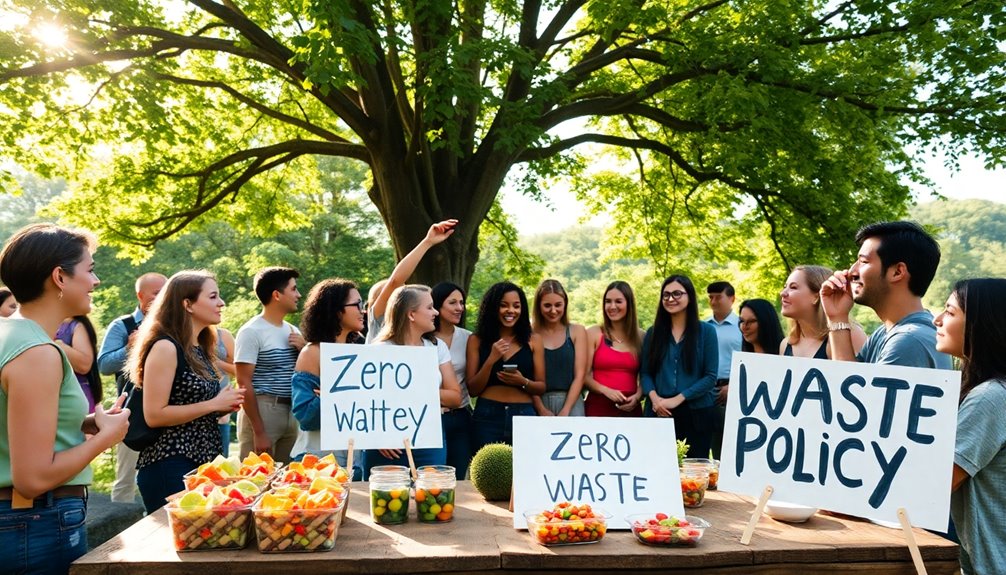
Implementing alternatives to single-use plastics is just one part of the sustainability journey for retreat centers. Highlighting successful events can inspire you to host your own Zero Waste Event.
Take cues from USC, which has effectively minimized landfill contributions by utilizing waste sorting stations and custom aluminum bottles. During events like Trojan Family Weekend, clear signage and compostable foodware led to impressive waste sorting rates.
Collaborating with sustainability experts, as seen in the Salute to Troy event, guarantees accessible waste sorting for all attendees. These efforts have diverted millions of plastic bottles from landfills annually, showcasing the impact of sustainable practices. Additionally, implementing advanced insulation materials can enhance energy efficiency and reduce environmental impact during events.
Resources for Sustainable Practices
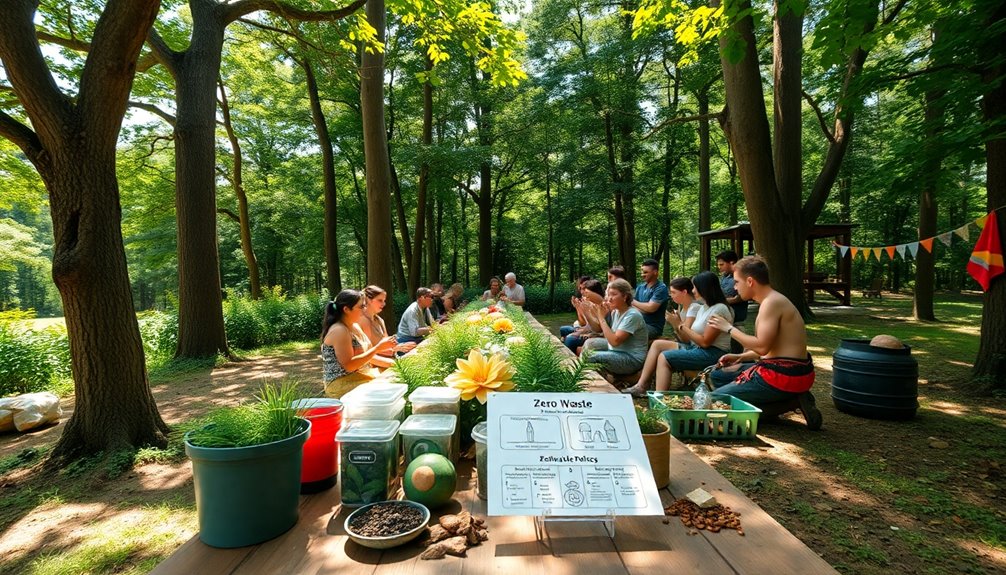
To foster a truly sustainable retreat center, you'll want to leverage a variety of resources that support eco-friendly practices. Here are some key strategies:
- Local Suppliers: Partner with local vendors who prioritize sustainability, reducing transportation emissions and fostering community engagement.
- Waste Separation: Implement clearly marked trash bins for compost, recycling, and landfill waste, ensuring at least 90% of materials are properly sorted during events.
- Educational Signage: Use informative signs to guide guests on your zero waste goals and proper disposal methods, including the correct way to recycle wine bottles. Incorporating eco-friendly practices like using dry, seasoned wood for heating can also contribute to your center's sustainability efforts.
Frequently Asked Questions
What Are the 7 R's of Zero Waste?
The 7 R's of Zero Waste are essential for minimizing waste in your life.
First, refuse unnecessary items to prevent waste.
Then, reduce your consumption by choosing quality over quantity.
Reuse items as much as possible, and recycle materials to create new products.
Repair broken items instead of tossing them out, and compost organic waste to enrich the soil.
Finally, rethink your consumption habits and product designs to prioritize sustainability and lower your environmental impact.
What Are the 5 Rules of Zero Waste?
Imagine a world where every item has a purpose, and waste is a distant memory.
To embrace zero waste, you'll follow five essential rules: Refuse unnecessary items, reducing what you consume, and choosing reusable products over disposables.
Recycle properly by sorting materials, ensuring they find new life.
Finally, compost organic waste, transforming scraps into nutrient-rich soil.
How Does Zero Waste Promote Sustainability?
Zero waste promotes sustainability by encouraging you to minimize waste generation and maximize resource efficiency.
By adopting practices like recycling, composting, and reusing, you reduce your environmental impact and conserve natural resources.
It fosters a culture of mindfulness about consumption, pushing you and others to make conscious choices.
This mindset not only lessens landfill contributions but also empowers you to embrace sustainable habits, benefiting both the planet and your community in the long run.
What Are the 6 R's of Zero Waste?
The 6 R's of zero waste are Refuse, Reduce, Reuse, Recycle, Rot, and Repair.
You can start by refusing unnecessary items, like single-use plastics, to prevent waste.
Then, reduce your consumption by choosing products with less packaging.
Next, reuse items creatively instead of tossing them out.
Recycling transforms materials into new products, while composting (or "Rot") allows organic waste to nourish the soil.
Finally, repair items to extend their lifespan and minimize waste.
Conclusion
So, if you think creating a zero waste policy is just a trendy fad, you might want to check your recycling bin for those outdated ideas. Embracing sustainability isn't just for tree-huggers; it's for everyone who enjoys breathing clean air and sipping water that doesn't taste like plastic. By following these steps, you'll not only impress your guests but also earn the title of "Eco-Warrior" without the need for a cape. Let's save the planet, one retreat at a time!
